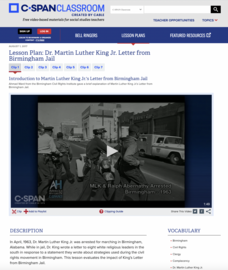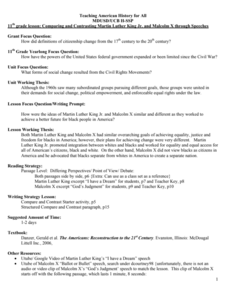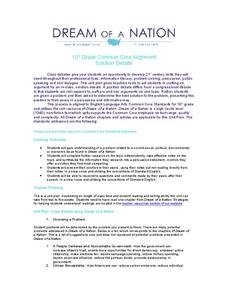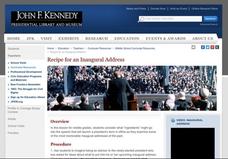Maryland Department of Education
A Raisin in the Sun and Dreams Deferred
To conclude a study of A Raisin in the Sun and to prepare for a visit to the Lewis Museum, class members analyze Langston Hughes' poem "Harlem." Learners then draw connections to characters in the play and to their own experiences by...
C-SPAN
Dr. Martin Luther King Jr.'s Letter from Birmingham Jail
Timing is everything. Introduce young historians to Dr. Martin Luther King, Jr.'s "Letter from Birmingham Jail" with a resource that underscores the significance of the timing of the Good Friday Birmingham march, King's subsequent...
Digital Public Library of America
The Watsons Go To Birmingham—1963 by Christopher Paul Curtis
A primary source set of photographs, videos, newspaper articles, and FBI reports provides insight into race relations during the 1960s, the Sixteenth Street Baptist Church bombing, and the murder of Emmitt Till. Designed to be used to...
Digital Public Library of America
Their Eyes Were Watching God by Zora Neale Hurston
Zora Neale Hurston's novel Their eyes Were Watching God has been highly praised and severely criticized for its depiction of African American folk culture. A set of primary source materials, including photographs, articles, essays, and...
Simon & Schuster
Curriculum Guide to: A Tale of Two Cities by Charles Dickens
A Tale of Two Cities is the core text for five lessons in a Curriculum Guide for Charles Dickens' famous novel. To begin, scholars examine Dickens' use of anaphora in the first line of the novel. Next, they compare the point of view in a...
Franklin D. Roosevelt Presidential Library & Museum
Pearl Harbor Activity #1: Newspaper or Radio Account
After listening to President Franklin D. Roosevelt's "Day of Infamy" speech, young historians research information about the Japanese attack on Pearl Harbor, possible motives for the attack, and the consequences of the attack. Scholars...
Franklin D. Roosevelt Presidential Library & Museum
Pearl Harbor Activity #3: Public Opinion Word Cloud
As part of a study of the December 7, 1941 attack on Pearl Harbor, young historians imagine the feelings of those who lived during the attack by creating a word cloud of 10 words they think express the emotions of people at that time....
Franklin D. Roosevelt Presidential Library & Museum
Pearl Harbor Activity #4: Who is the Audience?
Young historians use the prompts on a worksheet to analyze President Roosevelt's "Day of Infamy" speech. They identify the intended audience for the speech, the devices FDR used to persuade his audience, the responses promoted, and the...
K20 LEARN
LBJ and Voting Rights
Challenges to voting rights is not a new thing. Using President Lyndon B. Johnson's 1965 "The American Promise" speech on voting rights as a starting point, young historians research current voting rights laws and challenges.
National Endowment for the Humanities
Toni Morrison's Beloved: For Sixty Million and More
Complex, disturbing, and challenging, Beloved is the focus of a lesson that provides three activities to guide a close reading of Toni Morrison's novel. Readers create chapter titles based on key plot elements or themes, identify...
National Endowment for the Humanities
García Márquez’s Nobel Prize Speech: “The Solitude of Latin America”
To conclude a study of One Hundred Years of Solitude, class members analyze Gabriel Garcia Marquez's Nobel Prize in Literature acceptance speech. After a whole-class discussion of the main ideas in the speech, individuals draft a...
Penguin Books
The Discussion Guide to the Inaugural Poem: The Hill We Climb by Amanda Gorman
National Youth Poet Laureate Amanda Gorman's "The Hill We Climb," featured at the 2021 inauguration of President Joseph Biden, is the focus of a six-page guide. The guide includes before reading, during reading, and after reading...
K20 LEARN
Ethos, Logos, Pathos: Persuading Your Audience
Ethics, emotion, reason—scholars investigate advertisers' persuasive techniques to attract buyers. After examining the techniques used in infomercials, writers craft a persuasive essay on a topic of their choice.
K20 LEARN
Friends, Romans, Countrymen, Lend Me Your Emotions: Julius Caesar
Scholars, high schoolers, class members! With the help of this lesson, you too can identify the three persuasive appeals (ethos, pathos, and logos) the characters in William Shakespeare's tragedy Julius Caesar used to convince their...
Curated OER
Putting it Together: Analyzing and Producing Persuasive Text
Young orators demonstrate what they have learned about persuasion and persuasive devices throughout the unit by analyzing a persuasive speech and then crafting their persuasive essays. Class members engage in a role-play exercise, use...
K20 LEARN
Say It with Style: Syntax and Parallel Structure
Dr. Martin Luther King, Jr.'s "I Have a Dream" speech provides the text for a lesson plan that introduces scholars to the significance of syntax. After examining several types of clauses, phrases, and structures, class members use the...
PBS
Dr. Martin Luther King Jr.’s ‘I Have a Dream’ Speech as Visual Text
Young historians watch a video of Dr. Martin Luther King Jr. delivering his "I Have a Dream" speech and answer questions that test their knowledge of the event. After discussing the fact sheet, they reread the speech, select a phrase or...
National Endowment for the Humanities
Shakespeare's Julius Caesar: Leadership and a Global Stage
Shakespeare's Julius Caesar is, among other things, the study of a ruler's ambitions. Young scholars watch videos, read articles, and keep a Commonplace Book while studying the play. At the end of Act III, pupils stage the play that...
Rancocas Valley Regional High School
Teaching American History for All
Although Dr. Martin Luther King, Jr. and Malcolm X both work for equal rights, social change, and political empowerment, their approaches were radically different. To better understand these contrasts, class members compare King's "I...
Curated OER
MLK Letter From Birmingham Jail Analysis
Designed as a PowerPoint presentation for AP English class, this resource provides a detailed analysis of the content, format, and purpose of Dr. Martin Luther King, Jr’s “Letter from the Birmingham Jail.” Because much of the...
Dream of a Nation
Solution Debate
Class members choose a current social, political, environmental, or economic problem presented in Tyson Miller's Dream of a Nation: Inspiring Ideas for a Better America, research this problem and a variety of suggested solutions, before...
Maryland Department of Education
The Concept of Diversity in World Literature Lesson 8: Nonfiction Close Reading
As part of their study of Things Fall Apart, class members conduct a close reading of a section of Chinua Achebe's essay, "An Image of Africa: Racism in Conrad's Heart of Darkness." Jigsaw groups then compare the voice in the essay...
John F. Kennedy Presidential Library & Museum
Recipe for an Inaugural Address
An inaugural address represents the first moments of a new beginning. Using John F. Kennedy's speech as a model for guided practice, groups examine the ingredients of an inaugural address. Individuals then repeat the analysis process...
Close Up Foundation
Teach the Vote
Why is voting important? A social studies unit presents a non-partisan approach to the importance of voting, to voting laws and procedures, and to resources that voters need to become informed voters.
Other popular searches
- Rhetorical Devices
- Public Speaking Rhetoric
- Gettysburg Address Rhetoric
- Rhetorical Questions
- Speech and Rhetoric
- Rhetorical Analysis
- Rhetoric Logos Pathos Ethos
- Political Rhetoric
- Speeches Rhetoric
- Speech Rhetorical Devices
- Rhetorical Devices in Songs
- Rhetorical Strategies

























